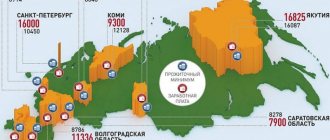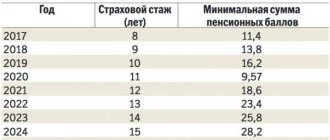The pension reform in our country affected literally every citizen, the changes also affected teachers. Formally, to retire, teachers, as before, need to accumulate 25 years of work experience. But now the length of service will be applied with a delay. In 2019 it will be 1 year, and then will increase annually to 5 years.
- Long service pension
- What pension do teachers receive?
- How is the pension calculated?
Regulatory framework for preferential pensions for teachers.
The assignment of benefits if you have experience in an educational organization in a teaching position is regulated by the following documents:
- Decree of the Government of the Russian Federation No. 665 of July 16, 2014;
- Decree of the Government of the Russian Federation No. 781 of October 29, 2002;
- Order of the Ministry of Education and Science No. 1601 of December 22, 2014, etc.
The pension reform, which came into force on January 1, 2019, introduced changes to the retirement age. However, she did not touch upon the requirements for the number of years worked and position.
Categories of teaching staff
First, it’s worth understanding the categories of teachers who can generally count on payments, since not everyone is eligible.
These include:
- Teachers of the main subjects.
- Music teachers.
- Workers in preschool institutions.
Important! Before you go and apply for a pension, you should first find out whether the institution where the teacher works is included in the list of special places.
The procedure for applying for preferential pensions for teachers.
A preferential pension for teachers based on length of service is issued if the following requirements are met:
- teaching experience 25 years;
- the presence of a minimum individual pension coefficient on the date of registration of benefits;
- the load is not less than that set for the rate;
- position approved by legislative acts.
Receiving a preferential allowance is possible only if the teacher has a full workload.
The standard hours per rate depend on the position and should be no less than:
- 36 hours a week for methodologists, university teachers, teacher-organizers;
- 30 hours – for a senior teacher in a preschool educational institution;
- 20 hours – speech therapists;
- 18 hours – subject teachers in public education, additional education teachers, teachers of art schools, coaches in sports schools.
When applying for a preferential pension, the age of teachers is not taken into account. All that matters is having teaching experience and the required number of pension points.
Length of service for teachers from 2019
Teachers, educators and other citizens engaged in teaching activities will be able to apply for an early pension, regardless of their age, after working for 25 years in their profession . As noted earlier, the new pension reform for teachers will not affect the length of service required to receive a preferential pension - it will still be 25 years.
| Name of company | Job title |
| General educational institutions (school, gymnasium, college, etc.) |
|
| General education boarding schools (boarding gymnasium, cadet boarding school, etc.) | |
| Educational institutions for orphans (orphanage, boarding school, etc.) | |
| Health educational institutions of sanatorium type (sanatorium boarding school) | |
| Special (correctional) general educational institutions for children with developmental disabilities (kindergarten, school, etc. | |
| Educational institutions for children of preschool and primary school age (primary school - kindergarten, secondary school) | |
| Secondary professional educational institutions Education (secondary educational institutions: technical school, boarding school, music school, lyceum school, etc.) and other institutions | |
| Additional institutions children's education (center for additional education for children, development of children's creativity, extracurricular activities, etc.) |
|
| Palace of children's (youth) creativity, students, children's and youth tourism, children's culture, station of young naturalists and others |
List of pensioners' benefits.
It is important not only the experience of teachers’ preferential pension, but also the inclusion of the position in the list provided for by law. The full list is contained in Resolution No. 781 of October 29, 2002.
Among the workers who can receive benefits early are:
- directors and their deputies;
- teachers;
- kindergarten teachers;
- speech therapists and defectologists;
- social educators;
- senior teachers;
- teachers of out-of-school centers.
Some categories have restrictions. Thus, administrative employees can retire before the due date only if they combine their main position with a teaching load of at least 6 hours.
The exception is directors and head teachers of correctional schools and orphanages.
Teachers of club and extracurricular activities, and leaders of children's associations can receive a preferential pension if, as of January 1, 2001, their work experience is at least 16.8 years.
This fact must be recorded in the work book and orders of the organization’s personnel department.
When calculating the length of service of a teaching worker, the following periods are taken into account:
- working hours for which contributions to the Pension Fund were transferred;
- time of illness, if confirmed by a certificate of incapacity for work;
- vacation;
- maternity leave until October 6, 1992.
If a teacher gets a job in an educational organization and then goes to study in his specialty, the years of training are included in the teaching experience.
The right to early assignment of pension: labor and insurance.
Method of calculating experience
There are some restrictions when calculating length of service:
- For teachers of institutions where they receive additional education, work experience until the end of December 2001 is fully counted.
- The teacher’s work experience includes the entire period of his work, starting from September 2000.
- Time spent working as a teacher, as well as a nurse or teacher, is considered preferential until the end of December.
The entire list of restrictions and the procedure for recording teachers’ working hours is presented on the official portal of the Russian government.
Many people are interested in whether long-term leave is included in a teacher’s experience if he was caring for a child. Experts answer that the period a mother is on maternity leave is part of her teaching experience. Child care ends when he is one and a half years old. This period of time is included in the so-called general insurance period.
Changes in pension legislation.
In 2020, a reform in pension legislation started in Russia. According to the changes, women can apply for old-age benefits at the age of 60, men 5 years later.
The preferential teacher pension for 2020-2021 will remain, however, adjustments have been made to the conditions for receiving it. The benefit will be assigned only 5 years after achieving the required teaching experience to receive it.
In other words, a teacher must work for 25 years in a position included in the approved list of preferential categories, and after 5 years apply to the Pension Fund for payment.
However, a gradual entry into force of the reform is planned. Teachers who have worked for 25 years by 2020 can apply for benefits six months after the day this right arises.
The following deadlines for transferring pension registration are provided:
- 2020 – 2021, 2022;
- 2021 – 2024;
- 2022 – 2026;
- 2023 – 2028.
In addition to the mandatory length of service, a teacher must accumulate a certain number of pension points. In 2020, their size is 16.2, but by 2023 at least 30 are planned.
A bill has been prepared to gradually increase the retirement age
Such situations are typical for persons undergoing advanced training, citizens entering an internship, residency, etc.
If during his studies a student took part in surgical interventions, then he has the right to count on being included in his work experience for a longer period (a year and a half). However, this rarely happens, usually in court.
- Social pension for the loss of a breadwinner: amount, size, law.
- Survivor's insurance pension: amount, size, documents.
- Benefits for public transport: disabled people, pensioners, students, families with many children.
- Preferential pension for teachers: according to length of service, changes, law.
- Social workers caring for pensioners: how to register, responsibilities.
- How to obtain a pension certificate: through the MFC, through State Services.
They plan to increase it smoothly and step by step. Women born in 1964 will have to work one year more and retire at 56 in 2020.
Further, born in 1965 at the age of 57 in 2022.
On June 14, the Russian Government approved the draft federal law “On Amendments to Certain Legislative Acts of the Russian Federation on the Appointment and Payment of Pensions,” prepared by the Russian Ministry of Labor.
The bill is aimed at gradually increasing the age at which an old-age insurance pension will be awarded.
Categories of citizens who will be affected by an increase in the working period
The bill proposes fixing the generally established retirement age at 65 and 63 years for men and women, respectively (currently 60 and 55 years).
The change in retirement age is expected to begin on January 1, 2019.
The increase in the retirement age will be gradual: a long transition period is envisaged - from 2020 to 2028 for men and 2019 to 2034 for women. Thus, the transition period will be 10 years for men and 16 years for women.
The increase in the retirement age will be the first to affect men born in 1959. and women born in 1964 Citizens of the indicated years of birth, taking into account transitional provisions, will have the right to retire in 2020 - at the ages of 61 and 56 years, respectively.
Respectively:
- men born in 1959, women born in 1964 – will receive the right to retire in 2020 (at the ages of 61 and 56 years, respectively);
- men born in 1960, women born in 1965 – will receive the right to retire in 2022 (at the ages of 62 and 57 years, respectively);
- men born in 1961, women born in 1966 – will receive the right to retire in 2024 (at the ages of 63 and 58 years, respectively);
- men born in 1962, women born in 1967 – will receive the right to retire in 2026 (at the ages of 64 and 59 years, respectively);
- men born in 1963, women born in 1968 – will receive the right to retire in 2028 (at the age of 65 and 60 years, respectively);
- women born 1969 – will receive the right to retire in 2030 (at the age of 61);
- women born 1970 – will receive the right to retire in 2032 (at the age of 62);
- women born in 1971 – will receive the right to retire in 2034 (at the age of 63).
The retirement age will increase with the transition period for some categories of workers retiring early, namely:
- workers who retire early due to work in the Far North and in areas equivalent to the Far North. For those whose retirement age is set at 55 years (for men) and 50 years (for women), the retirement age will be increased to 60 years and 58 years, respectively. A significant reduction in the retirement age for northerners was caused in the 50s of the 20th century by extremely difficult living conditions in these areas. In fact, the complete lack of infrastructure for work and life predetermined such a low age. Measures taken as part of the long-term demographic program for 2007-2025 have had a positive impact on changing the situation with life expectancy, especially in the northern regions of the country.
- pedagogical, medical, creative workers. For this category of workers, based on their social significance, the institution of early pensions is preserved in full: no tightening of requirements for special length of service is provided. At the same time, based on the general increase in working age, for these citizens the age for early retirement is increased by 8 years. The new retirement age will be calculated based on the date of completion of special service and acquisition of the right to early retirement. Now these categories of workers need to develop a special length of service lasting from 15 to 30 years, depending on the specific category of the beneficiary. Thus, the age at which these workers complete special service and acquire the right to early retirement is fixed, and it will be possible to exercise this right (assign an “early” pension) in the period from 2020 to 2034 and beyond, taking into account the increase in working age and transitional provisions.
The bill also proposes, from January 1, 2020, an increase in the growth rate of the increase in the retirement age for civil servants - one year per year. Thus, the retirement age for civil servants is brought into line with the proposal for the rate of increase in the generally established age.
The bill provides for changes related to the age of retirement of social pension.
For citizens who have not worked or have not acquired the full length of service required to receive an insurance pension, a social pension will now be assigned not at 60 (women) and 65 years (men), but at 68 and 70 years, respectively. These changes are proposed to be carried out gradually.
Citizens with significant disabilities have the right to apply for a disability determination and, if the decision is positive, receive a social disability pension (regardless of age).
Categories of citizens who will not be affected by the increase in working period
Raising the retirement age does not affect current pensioners; this is about 46.5 million pension recipients (both through the Russian Pension Fund and the security agencies). They, as before, will receive all pension and social payments due to them in accordance with the acquired pension rights and benefits.
I. for citizens working in workplaces with dangerous and harmful working conditions, in whose favor the employer pays insurance premiums at the appropriate rates established based on the results of a special assessment of working conditions, namely:
- in underground work, in work with hazardous working conditions and in hot shops (men and women);
- in difficult working conditions, as locomotive crew workers and workers directly organizing transportation and ensuring traffic safety on railway transport and the subway, as well as truck drivers in the technological process in mines, open-pit mines, mines or ore quarries (men and women);
- in the textile industry in work with increased intensity and severity (women);
- in expeditions, parties, detachments, on sites and in teams directly on field geological exploration, search, topographic and geodetic, geophysical, hydrographic, hydrological, forest management and survey work (men and women);
- as sailors on ships of the sea, river fleet and fishing industry fleet (men and women), with the exception of port ships permanently operating in the port water area, service and auxiliary and traveling ships, suburban and intracity vessels, as well as in mining and processing operations fish and seafood, acceptance of finished products at the fishery (men and women);
- in underground and open-pit mining (including personnel of mine rescue units) in the extraction of coal, shale, ore and other minerals and in the construction of mines and mines (men and women);
- in the flight crew of civil aviation, in the work of controlling the flights of civil aviation aircraft, as well as in the engineering and technical staff in the work of servicing civil aviation aircraft (men and women);
- at work with convicts as workers and employees of institutions executing criminal penalties in the form of imprisonment (men and women);











